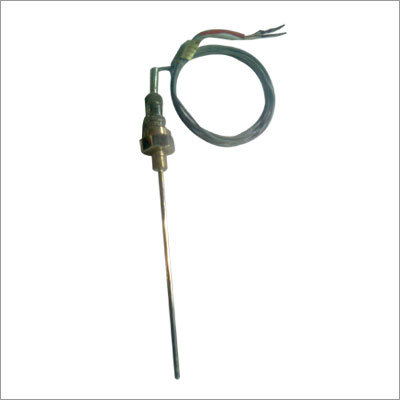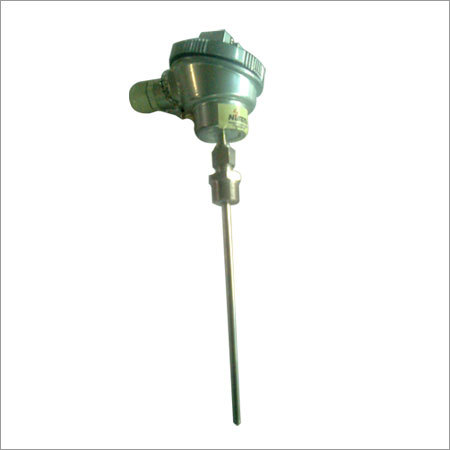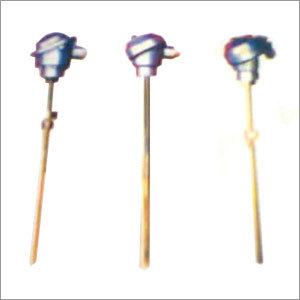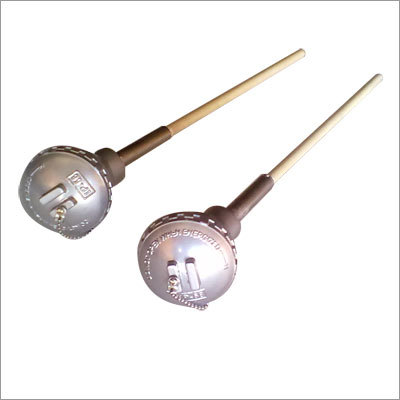B Type Thermocouple
B Type Thermocouple Specification
- Type
- B Type Thermocouple
- Theory
- Thermoelectric Principle
- Connection Method
- Fixed or Plug Connection
- Customized
- Available as per user requirements
- Density
- 20 Gram per cubic centimeter(g/cm3)
- Measuring Range
- 600C to 1700C
- Melting Point
- Above 1700C
- Precision
- High accuracy for temperature measurement
- Sensor Type
- Type B Thermocouple (Platinum Rhodium Pt30%Rh / Pt6%Rh)
- Size
- Standard: 3mm, 6mm, 8mm, 10mm, or custom sizes
- Temperature Range
- 0C to 1800C
- Tensile Strength
- High (suitable for industrial applications)
- Wire Length
- Customizable (standard 1 meter, other lengths available)
B Type Thermocouple Trade Information
- Minimum Order Quantity
- 1 Piece
- FOB Port
- Udaipur
- Supply Ability
- Piece
- Delivery Time
- 3-20 Days Days
- Packaging Details
- As per product
- Main Domestic Market
- Rajasthan
- Certifications
- ISO
About B Type Thermocouple
We are a coveted organization that is engaged in manufacturing, supplying and trading high quality B Type Thermocouple. Manufactured using high grade material, these products are sourced from reliable vendors of market. Available in various specifications, our reasonably priced range is in tandem with international quality standards. B Type Thermocouple is provided with moving slots, and they are widely used in production process under high temperature.
Precision Measurement for Extreme Environments
Designed with a platinum-rhodium sensor, the B Type Thermocouple delivers high accuracy even in challenging thermal settings, suitable for temperatures up to 1800C. Its durable construction makes it ideal for applications across the glass, metal, and ceramic industries, ensuring reliable operation in research and industrial environments alike.
Flexible Design and Customization Options
Users can select from various probe diameters, junction types (grounded or isolated), and connection methods (fixed or plug) to match their application needs. Customizable wire lengths and extension cables are offered, accommodating specific installation requirements. The thermocouple is built with high tensile strength for demanding conditions.
FAQs of B Type Thermocouple:
Q: How does a B Type Thermocouple operate in high-temperature industrial environments?
A: The B Type Thermocouple functions based on the thermoelectric principle, utilizing platinum and rhodium wires to generate a voltage corresponding to temperature. Its robust design and high melting point (>1700C) enable accurate temperature measurement in extreme settings like glass, metal, and ceramic processing.Q: What are the available probe diameters and can they be customized for specific applications?
A: Standard probe diameters include 3mm, 6mm, 8mm, and 10mm, with options to customize sizes to meet precise application requirements. This flexibility supports integration into various industrial setups and research instruments.Q: When should I choose an isolated (ungrounded) junction over a grounded one?
A: An isolated junction is preferred when electrical isolation from the measurement environment is necessary, such as in research applications where noise or interference is a concern. This helps ensure accurate readings in sensitive installations.Q: Where is the B Type Thermocouple commonly used?
A: This thermocouple is widely utilized in the glass, metal, and ceramic industries, as well as in laboratories and research facilities that require reliable high-temperature measurement and robust performance.Q: What is the process for selecting a termination type and extension cable?
A: Selection depends on installation requirements. Users can choose between bare wires, spade lugs, or standard connectors for termination, and compensating extension cables are available to the length and specification needed for the application.Q: How can users benefit from the customizable options offered for this thermocouple?
A: Custom sizes, wire lengths, and connection methods enable seamless integration into existing systems, meeting unique operational needs and enhancing measurement accuracy and reliability.

Price:
- 50
- 100
- 200
- 250
- 500
- 1000+
More Products in Metallic Thermocouples Category
Base Metal Thermocouples
Minimum Order Quantity : 1 Piece
Melting Point : Up to 1450C (based on type and sheath material)
Tensile Strength : High, suitable for process applications
Density : 8.4 Gram per cubic centimeter(g/cm3)
Precision : High precision for industrial use
Size : Standard and customized sizes available (typically 3mm to 20mm OD)
Type R Thermocouple
Minimum Order Quantity : 1 Piece
Melting Point : Above 1600C
Tensile Strength : High durability, standard for thermocouple use
Density : 21.5 Gram per cubic centimeter(g/cm3)
Precision : High accuracy, suitable for industrial measurements
Size : Standard probe diameter 3mm to 8mm
S Type Thermocouples
Minimum Order Quantity : 1 Piece
Melting Point : Platinum 1768C / Rhodium 1964C
Tensile Strength : High (suitable for industrial application)
Density : 21.45 Gram per cubic centimeter(g/cm3)
Precision : High
Size : Standard diameters: 0.45 mm to 3.2 mm
We Mainly Deal In Udaipur, Rajasthan.

 Send Inquiry
Send Inquiry Send Inquiry
Send Inquiry



